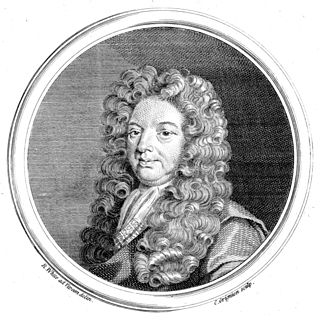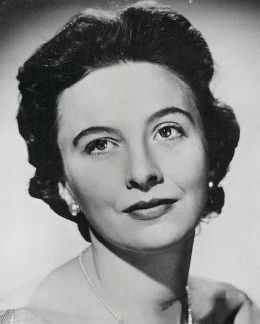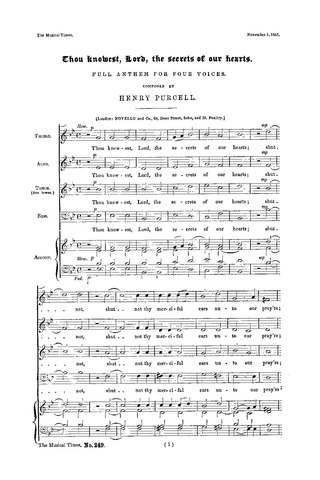Related Research Articles

Henry Purcell was an English composer of Baroque music, most remembered for his more than 100 songs; a tragic opera, Dido and Aeneas; and his incidental music to a version of Shakespeare's A Midsummer Night's Dream called The Fairy Queen.

John Blow was an English composer and organist of the Baroque period. Appointed organist of Westminster Abbey in late 1668, his pupils included William Croft, Jeremiah Clarke and Henry Purcell. In 1685 he was named a private musician to James II. His only stage composition, Venus and Adonis, is thought to have influenced Henry Purcell's later opera Dido and Aeneas. In 1687, he became choirmaster at St Paul's Cathedral, where many of his pieces were performed. In 1699 he was appointed to the newly created post of Composer to the Chapel Royal.

Saint Cecilia, also spelled Cecelia, was a Roman Christian virgin martyr, who is venerated in Catholic, Orthodox, Anglican, and some Lutheran churches, such as the Church of Sweden. She became the patroness of music and musicians, it being written that, as the musicians played at her wedding, Cecilia "sang in her heart to the Lord". Musical compositions are dedicated to her, and her feast, on 22 November, is the occasion of concerts and musical festivals. She is also known as Cecilia of Rome.

Dido and Aeneas is an opera in a prologue and three acts, written by the English Baroque composer Henry Purcell with a libretto by Nahum Tate. The dates of the composition and first performance of the opera are uncertain. It was composed no later than July 1688, and had been performed at Josias Priest's girls' school in London by the end of 1689. Some scholars argue for a date of composition as early as 1683. The story is based on Book IV of Virgil's Aeneid. It recounts the love of Dido, Queen of Carthage, for the Trojan hero Aeneas, and her despair when he abandons her. A monumental work in Baroque opera, Dido and Aeneas is remembered as one of Purcell's foremost theatrical works. It was also Purcell's only true opera, as well as his only all-sung dramatic work. One of the earliest known English operas, it owes much to John Blow's Venus and Adonis, both in structure and in overall effect.

Ode for the Birthday of Queen Anne is a secular cantata composed by George Frideric Handel to a libretto by Ambrose Philips, of which the first line, "Eternal source of light divine", provides an alternative title for the work. It was probably composed during January 1713 for a performance on 6 February 1713, although there is no record of the performance having actually taken place. Other catalogues of Handel's music have referred to the work as HG xlvi A; and HHA i/6.
The year 1695 in music involved some significant events.

The Fairy-Queen is a semi-opera by Henry Purcell; a "Restoration spectacular". The libretto is an anonymous adaptation of William Shakespeare's comedy A Midsummer Night's Dream. First performed in 1692, The Fairy-Queen was composed three years before Purcell's death at the age of 35. Following his death, the score was lost and only rediscovered early in the twentieth century.

Hymn to St Cecilia, Op. 27 is a choral piece by Benjamin Britten (1913–1976), a setting of a poem by W. H. Auden written between 1940 and 1942. Auden's original title was "Three Songs for St. Cecilia's Day", and he later published the poem as "Anthem for St. Cecilia’s Day ".

Hail! Bright Cecilia (Z.328), also known as Ode to St. Cecilia, was composed by Henry Purcell to a text by the Irishman Nicholas Brady in 1692 in honour of the feast day of Saint Cecilia, patron saint of musicians.

Alexander's Feast is an ode with music by George Frideric Handel set to a libretto by Newburgh Hamilton. Hamilton adapted his libretto from John Dryden's ode Alexander's Feast, or the Power of Music (1697) which had been written to celebrate Saint Cecilia's Day. Jeremiah Clarke set the original ode to music.
Charles Daniels is an English tenor, particularly noted for his performances of baroque music. He is a frequent soloist with The King's Consort, and has made over 25 recordings with the ensemble on the Hyperion label.
Ode for St Cecilia's Day are odes for St Cecilia the patron saint of music and may refer to musical works by:
William Turner was a composer and countertenor of the Baroque era. A contemporary of John Blow and Henry Purcell, he is best remembered for his verse anthems, of which over forty survive. As a singer, he was a Gentleman of the Chapel Royal from 1669 until his death.

April Rosemary Cantelo was an English soprano. She created roles in operas by major composers, including the title role of Semele by John Eccles, Helena in Britten's A Midsummer Night's Dream, and in several works by Malcolm Williamson such as English Eccentrics.
Come Ye Sons of Art, Z.323, also known as Ode for Queen Mary's Birthday, is a musical composition by Henry Purcell. It was written in 1694, and is one of a series of odes in honour of the birthday of Queen Mary II of England. The text of the ode is often attributed to Nahum Tate, who was poet laureate at the time.
Rogers Henry Lewis Covey-Crump is an English tenor noted for his performances in both early music and contemporary classical music. He has sometimes been identified as an haute-contre tenor. He has performed for over 50 years in choirs and ensembles such as the Hilliard Ensemble, and as a soloist. He has been especially in demand for the part of the Evangelist in Bach's St Matthew Passion and St John Passion. He also specialises in vocal tuning, and has written articles on the subject.

"Hear my prayer, O Lord", Z. 15, is an eight-part choral anthem by the English composer Henry Purcell (1659–1695). The anthem is a setting of the first verse of Psalm 102 in the version of the Book of Common Prayer. Purcell composed it c. 1682, at the beginning of his tenure as Organist and Master of the Choristers for Westminster Abbey.
Ode to St. Cecilia may refer to:

"Thou knowest, Lord, the secrets of our hearts", Z. 58, designates two choral settings composed by Henry Purcell. The text is one of the Anglican funeral sentences from the Book of Common Prayer. Early versions began possibly in 1672 and were revised twice before 1680. Purcell composed his last version, in a different style, for the 1695 Music for the Funeral of Queen Mary, Z. 860.
References
- 1 2 From between 1680 and 1695 twenty-four of Purcell’s Odes and Welcome Songs survive: four celebrate St Cecilia’s day. (Odes, Vol. 1 – Royal and Ceremonial Odes. Hyperion Records)
- ↑ Spink, Ian (2001). "Fishburn, Christopher". Grove Music Online. Retrieved 24 February 2018.(subscription required)
- ↑ Baine, Rodney M. (1946). "Rochester or Fishbourne: A Question of Authorship". The Review of English Studies. 22 (87): 201–206. ISSN 0034-6551.
- 1 2 "Purcell Odes". Gramophone . Retrieved 20 November 2017.
- ↑ Hugh Arthur Scott. “London's First Concert Room.” Music & Letters, vol. 18, no. 4, 1937, pp. 379–390. JSTOR 727265.
- ↑ Thu 29 Aug 1963 Royal Albert Hall. Proms performance archive. bbc.co.uk.
- ↑ "Purcell, Henry (1659–1695)", Robert Thompson in Oxford Dictionary of National Biography , ed. H. C. G. Matthew and Brian Harrison (Oxford: Oxford University Press, 2004); online ed., ed. David Cannadine, January 2008. Accessed November 18, 2017 (subscription or UK public library membership required).
- ↑ Zimmerman, Franklin B. JSTOR 895232 Review (untitled)]. Notes, vol. 22, no. 4, 1966, pp. 1311–1312.
- 1 2 JSTOR 740673. Review (untitled)]. The Musical Quarterly , Vol. 46, No. 3 (Jul., 1960), pp. 408–410.